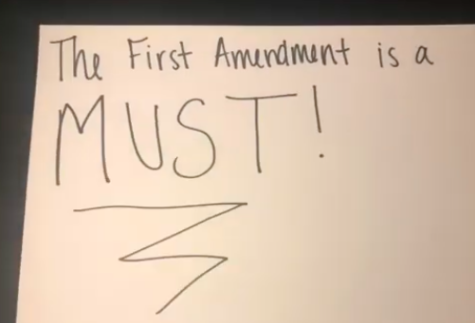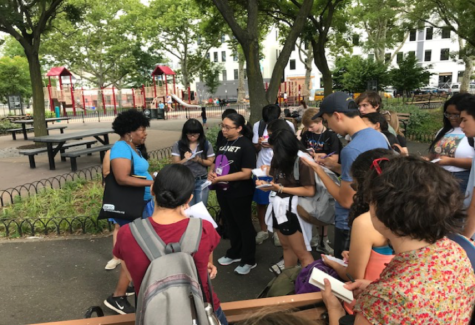Tips for Reporting the Legalization of Marijuana
As more and more states legalize medical and/or recreational marijuana, journalism advisers and students are finding themselves in new territory. As of May 2019, federal laws treat marijuana as a controlled substance, which makes understanding how the laws work tricky. This map features a state-by-state breakdown that can help both reporters and advisers alike.
 Despite the confusion, school publications are finding ways to report on this topic. Several advisers and a student editor offer their advice to help your journalism staff successfully cover this issue. We’ve also included links to student-produced work to help guide you and your students along the way.
Despite the confusion, school publications are finding ways to report on this topic. Several advisers and a student editor offer their advice to help your journalism staff successfully cover this issue. We’ve also included links to student-produced work to help guide you and your students along the way.
“My advice is to make sure that you are also collecting information from the experts – doctors, policy makers, etc. It helps build your credibility, especially if you go down the avenue of using anonymous sources since it is difficult to get students to talk on the record.”
- Erin Sucher-O’Grady, Clayton High School
“If the story is about legislation, the online bill tracker is a good thing to monitor. If possible, I’d limit my identified sources to people who are 18 or older. If you allow the students to use anonymous sources, my policy is that I have to know who the sources are. I won’t share that information, but I have to know that they are real people. Also, make sure sources are authoritative. Once I had a student try to include some internet rumors that were easily disproved via Snopes. Also, anything that gives you pause as an adviser is worth contacting the SPLC about.”
- Donald Johnson, Webster Groves High School
“I appreciated that my students looked at it from all directions. It was not agenda-based. They were just doing their jobs and informing their readers about what is happening in their world today. Missouri just passed legislation on medical marijuana, so this is happening now in our state. I would always encourage students to just seek the truth and report it. Do not decide it’s time to cover a sexy story for the sake of wanting to be able to smoke a joint whenever and wherever. That always makes a difference in whether it’s a good story or just sensationalized fodder.”
- Alison Long, Notre Dame de Sion High School
“Watch your verbiage. Cannabis is the plant from which both marijuana and hemp derive. Marijuana is the leaves and flowers with psychotropic properties. Different strains have different THC (tetrahydrocannabinol) concentrations. Don’t confuse this with hemp which is used to make clothing and such products. We took a lot of tips from expert Cannabis Journalists. Also, we learned early in the game, don’t mess with pot jokes or puns. They degrade your coverage quickly. We did a few student surveys to find out exactly the level of interest our students had in the topic and simply answered their questions using state-certified experts. The state will put marijuana enforcement offices in place. This should be the first phone call for any story as they are trained in all aspects of the issue.”
- Karla Shotts, Engelwood High School
My advice is to make sure that you are also collecting information from the experts – doctors, policy makers, etc. — Erin Sucher-O'Grady
“Sometimes you have experts on the subject right in your own school district. Talk with the health teacher who covers this in a unit and visit with the School Resource Officer. Perhaps you can put some feelers out online, too. I know on Facebook there are multiple Medical Marijuana and CBD Oil groups. From there, you can find links to possible sources. What was interesting in our case was finding that the Missouri Department of Health and Senior Services had a whole page of their website already devoted to the issue, even though it was just passed in November.”
- Michelle Turner, Washington High School
“#1. Be sure to have all perspectives represented and quoted.
#2. Find a way to connect the topic back to your own school. Get quotes from students, teachers, school nurses, school admin, etc.
#3. Find political figures in your area that have opinions on the topic. This can be state senators, political activist groups, lobbyists, mayors, aldermen, etc.
#4. Don’t be afraid to use anonymous sources! We had many students who were willing to share their experiences but not their names, and that’s ok. The only thing to be careful of is to not use too many anonymous sources; you can lose some of your credibility.
#5. Make sure that you find examples of medical AND recreational use; both are important topics right now!
#6. You might want to explore CBD or other things (associated with marijuana) that have been popping up recently!”
- Lila Taylor, Editor of The Globe, Clayton High School
Links to marijuana coverage:
- The Globe Magazine, Clayton High School
- WHS Echo Newspaper, Webster Groves High School
- Le Journal, Notre Dame de Sion High School
- The Pirateer, Engelwood High School
- Blue Jay Journal TV, Washington High School











takuyaru • May 31, 2019 at 1:52 pm
Thank you for your blog post.Really thank you! Awesome.